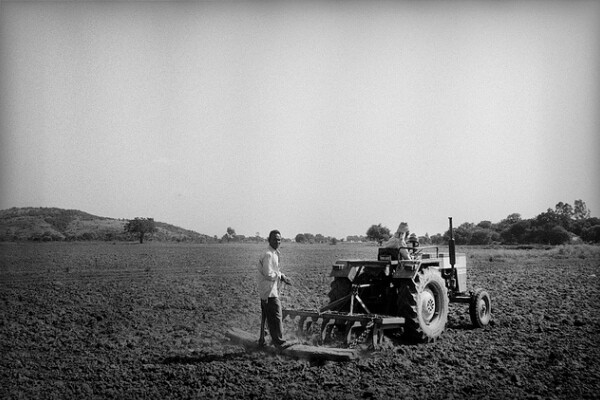Climate Change Is Destroying Our Food

When you think of climate change, you think of the weather. Summers where the sun bakes the parched land with the ferocity of an oven, winters where snow deposits climb higher than your house, extreme weather events like apocalyptic hurricanes and tornadoes that even the most bold storm chasers steer clear of. But the image that doesn't immediately enter our minds is what climate change is insidiously doing to what we eat
It's time to change that.
This week, the journal Nature Climate Change published a set of studies that looks at how the continually rising levels of CO2 in our atmosphere are affecting the quality of our food. They did this by looking at wheat samples that had been grown in 1996 using a technique that had boosted the amount of carbon dioxide in the field. They then cut the samples, sealed them up, and compared them to wheat that's been grown in normal levels of carbon dioxide. The findings:
Protein production in the carbon-dioxide-field-grown wheat had been inhibited.
Meaning that while the wheat grown in either environment looks the same, the actual contents of wheat grown with large amounts of CO2 contained a whole lot less protein. (To use a terrifying comparison: It would be like if all of the vats of your favorite IPA were suddenly, horrifically, turned into Bud Light; it's still technically beer, but is it really?)
Predictions as far as how much protein will no longer be in wheat in the future range from about three percent to eight percent, meaning the "protein available for human consumption may drop." While we Americans may not need to buy more protein at the store, our species certainly does need protein in order to survive. Having less around, especially as the planet's population continues to increase, will lead to more people being unable to afford food: Food prices are likely to go up somewhere in a wide range of 3 percent to 84 percent by 2050 just because of climate change, the report said.
That's not some far-away theoretical future. If you're 30 right now, that means food prices are going to skyrocket when you're in your mid-60s. And as Slate points out, less food availability is not a recipe for peace:
"If I were to pick a single indicator--economic, political, social--that I think will tell us more than any other, it would be the price of grain," says Lester Brown, president of the Earth Policy Institute, who has been writing about the politics and economics of food since the 1950s.
So, then. What do we do to avoid this future? While the overall effects of climate change aren't going to be countered with the short-term actions of a single person, there are subtle changes you can make to your eating habits that can ease the strain:
More than Meatless Mondays
It's proven that consuming meat is one of the most wasteful acts we participate in. Simply put, we're eating way too much of it. Meatless Mondays are all well and good, but there's a feeling that comes with participating in them that you've "earned" eating meat the rest of the week, and this mentality counters whatever good you've done on Garfield's least favorite day. Instead, add Meatless Thursdays and Fridays to the mix. They may not be as alliterative, but they help a lot more.
Cut Down on Coffee
This may be the toughest sacrifice for most of us, myself included. Coffee is great. I love coffee. It's also, unfortunately, one of the most wasteful foods, with so much water and gas going into its production and transportation. Instead of getting it every morning, push it to every other day. To help get yourself over your caffeine addiction, maybe think of it like this: A cup of Starbucks coffee is roughly $2. If you're an everyday drinker and you cut your consumption in half, you'll have an extra $30 by the end of the month. That's $360 by the end of the year. This is a case where you don't have to be entirely altruistic to help out.
Stop Wasting Food
I've already written about combating food waste, so there's no reason to get into it too deeply here. So, in short: Buy the amount of food you're going to eat and no more, reuse your restaurant leftovers, cut away parts of rotten food rather than throwing them out entirely. Perform this trio of activities, and you've done your part.